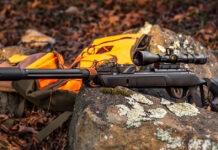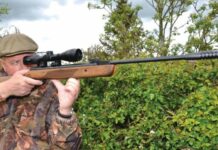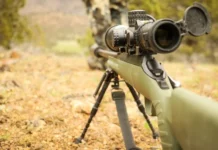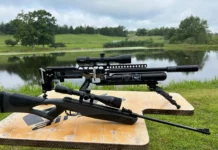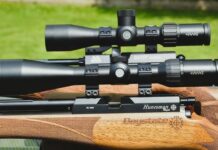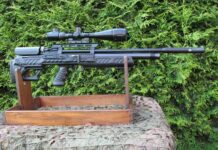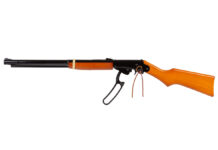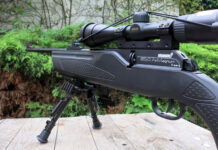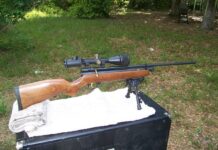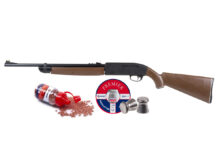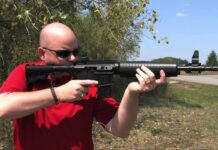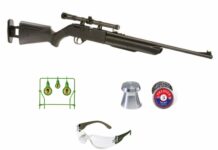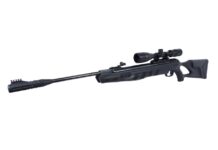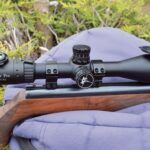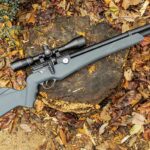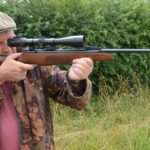If you’ve been hunting for some time, chances are, you’re familiar with buck fever. Or that you know of another hunter who has experienced buck fever.
It’s what causes you to miss a giant deer from close range, even though you can regularly hit the bullseye during target practice. It’s also the reason why you feel your heart rate go up, and your hands to start trembling when you’re out there, and you catch sight of that deer, or any other animal that you’re hunting.
But what is buck fever, and why do so many hunters experience it? And are there ways that you can overcome the jittery feeling when it’s time to take the shot?
Here, we’ll learn more about buck fever, it’s symptoms, and what causes it. We’ll also cover some remedies to help you stay calm and focused during your next hunt.
Table of Contents
What is buck fever?
Buck fever is a term that describes the nervousness that many hunters experience when they see a deer, and it’s time to take the shot.

According to a 2016 article published by Texas A&M University, buck fever is real, and it can even cause some experienced hunters to miss the broadside of a deer from close range [1].
The article also goes on to say that there is no real cure for buck fever. Fortunately, however, there are ways to keep buck fever under control, as we will discuss below.
But first, let’s take a look at some of the symptoms and explain why it happens.
What are the symptoms of buck fever?
Here are some of the potential symptoms of buck fever.
- Rapid heart rate
- Excessive sweating
- Trembling hands
- Narrow vision
- A perception that time is speeding up/slowing down
These physical symptoms, and in some severe cases, symptoms like nausea or loss of hearing, can present a real challenge for you as a hunter when it comes to taking an accurate shot on the animal.
Why do I experience buck fever?
When you’ve been out there, patiently waiting for hours, and you finally catch the sight of a buck, it is a thrilling moment. But it can also put a lot of pressure on you.
You might think of it as a rare moment for you to capitalize on the opportunity and deliver the kill shot, so you can provide nutritious food for your family. And as an ethical hunter, you also want to get it right the first time. You want the shot to be effective and lethal to minimize the animal’s suffering.
The added pressure of accuracy within a very small window of time can cause a spike in adrenaline hormone.
Adrenaline and buck fever
The elevated adrenaline is not necessarily a bad thing. Many hunters feel more alert and a greater sense of awareness because of the adrenaline spike, and they use it to their advantage to shoot more accurately.
But if adrenaline kicks into too much of an overdrive when you catch sight of that big-racked buck, it can exert too much on your cardiovascular system. It can cause your heart to pump blood with too much force, which is why you may feel like you’re losing control over your motor skills, and experience various symptoms of buck fever [2].
As we mentioned before, there isn’t really a “cure” for buck fever. And in a way, that’s a good thing, because you may not want it to go away completely.
Many hunters thrive on the adrenaline rush as it elevates intensity, and they cherish the increased awareness of the various emotions.
But if you feel like buck fever gets in your way of taking the best shot, whether it’s at the shooting range, or during an actual hunt, then you will benefit from learning how to control your emotions and calm your nerves.
5 tips to suppress buck fever and remain calm while hunting
Let’s examine five tips to help you remain calm and focused during your next hunting trip.
1. Are beta-blockers really effective against buck fever?
You might have tried beta-blockers in the past, or heard of another hunter who has used them to stave off the jitters.
Beta-blockers are a type of pharmaceutical drug that works by blocking the effects of adrenaline. They are typically prescribed by doctors in the form of Metoprolol & Propranolol in order to treat conditions like hypertension and irregular heartbeats.
Since adrenaline spikes are one of the primary factors behind buck fever, beta-blockers can be effective in preventing the physical symptoms.
But beta-blockers will always be a temporary solution. They do nothing as far as training you to become more resilient against buck fever. Additionally, they can have harmful side effects, and you can become dependent on them if you use them frequently [3]. And in the United States, you will need a prescription.
2. “Tactical breathing” to deactivate fight-or-flight mode

When you’re under intense pressure or stress, your body often switches to what is called the fight-or-flight, or survival mode. The survival mode prepares you to deal with any potential danger by increasing your alertness and awareness, and it is associated with the spike in adrenaline [2].
One of the most simple, yet effective, tools you have at your disposal to deactivate the fight or flight mode is “tactical breathing,” a trick used by Navy Seals to perform better under pressure [4].
Done right, “tactical breathing” can switch your nervous system back to a relaxed mode, and essentially act as a natural beta-blocker. You will feel your heart rate slow down back to normal, and the jitteriness disappear.
You can try it during your target practice, as well as when you’re getting ready to shoot during an actual hunt.
- Step 1: Take a deep breath into your stomach to a count of four.
- Step 2: Hold your breath and count to four.
- Step 3: Exhale slowly to a count of four.
- Step 4: Repeat the process till you feel calmer and in control.
3. Visualize the perfect shot (yes, it really works)
Imagining and practicing the perfect shot in your mind can help you remain calm and improve your performance under pressure.
If that sounds a bit too new-age-y, you should know that elite Olympians like Michael Phelps and Lindsay Vonn have used visualization techniques to improve their athletic performance when it mattered most [5][6].
Think of visualization as mental preparation for your next hunting trip. Take a few minutes each day to sit quietly, put yourself in a relaxed state through the breathing exercises mentioned earlier, and then imagine yourself taking the perfect shot at the deer.
Try to make it as vivid as possible. Involve all the senses. Imagine what it smells like, your hand on the trigger or the bow and arrow, the deer emerging, and anything else that you would experience in the real-life situation. You could even imagine yourself beginning to experience buck fever, and then overcoming it.
A visualization practice, along with all the regular preparations, will leave you better mentally prepared and more confident during your next hunt. It will make taking the shot less stressful and may diminish buck fever symptoms.
4. Mimic “real” hunting scenarios to gain confidence
When you practice, if you can mimic a real hunting scenario, it will prepare you better for the real deal.
Maybe you can practice with a 3-D deer and a treestand in the woods near where you live. Try to practice shooting from all kinds of distances that you might have to potentially shoot from when you’re hunting for a deer.
Although it will never be able to fully recreate the real situation, practicing enough in a mimicked environment can make you more familiar, and it might help you build greater confidence in your ability to shoot.
If you’re more confident about your shooting, then you’ll feel less stressed, and your buck fever won’t be as severe.
5. Try PerformZen to remain calm and collected under pressure
Along with breathing exercises, PerformZen can provide an extra boost in calmness and cognitive function.
PerformZen is a natural supplement designed to help performers remain calm under pressure. It is used by public speakers, actors during an audition, musicians who perform for live audiences, students preparing for important tests, professional athletes, and many others.
It can also help hunters suppress buck fever and remain calm when they have to take the perfect shot under extreme pressure.
PerformZen works by boosting GABA in your brain, a neurotransmitter associated with greater calmness [7]. It also contains L-theanine, an amino acid also proven to promote relaxation and calmness [8].
Not only will PerformZen help you remain calm under pressure, but it will also improve your mental focus. It contains magnesium and vitamin B6, the combination of which has been shown by research to improve cognitive function [9].
PerformZen also contains Theacrine and Ginkgo Biloba, both of which will further assist you with shaking off the jitters and in providing you with a clean boost of energy.
Unlike beta-blockers, a natural supplement like PerformZen works by supplying your brain with beneficial nutrients so that it can better handle stressful situations.
So is it possible to overcome buck fever?
Buck fever is a real phenomenon that is quite common among hunters, even experienced ones.
While you want your adrenaline levels to rise so you can elevate your intensity and awareness when taking the shot, you want to make sure that it doesn’t kick into overdrive and make you jittery.
Try some of the tips mentioned in this article, like “tactical breathing”, visualization, and real-life practice scenarios. And if you’re looking for an extra boost in calmness and mental focus, be sure to give PerformZen a try.



